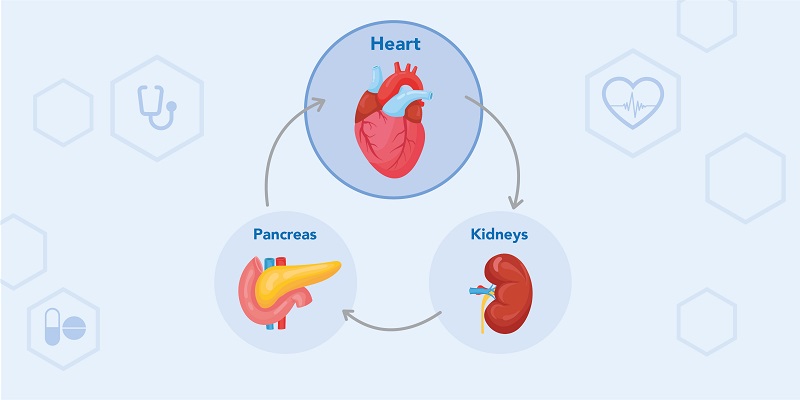Chronic kidney disease and CVRM
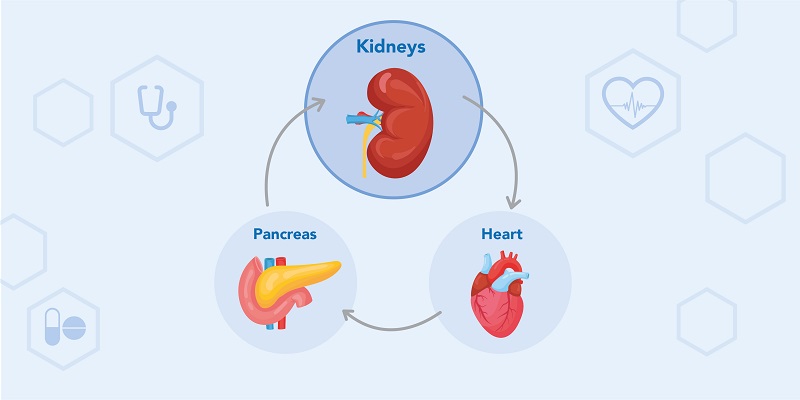
Kidney disease, cardiovascular disease and diabetes may co-occur forming a disease cluster called Cardiovascular Renal Metabolism (CVRM) disease. Learn how these conditions are interlinked and how best to combat them for great overall health.
What is CVRM?
Every organ in the body has a unique role but also relies on the harmonious functioning of other organs. When one doesn’t function optimally, it can strain the others, impacting overall health. A key illustration of this interconnectedness is how the heart, kidneys and pancreas relate to each other, and the linked conditions of cardiovascular disease, chronic kidney disease and Type 2 diabetes.
This interconnected system is referred to as “CVRM”:
CV: Cardiovascular – pertains to the circulatory system, encompassing the heart and blood vessels.
R: Renal – relates to the kidneys. When affected by chronic kidney disease (CKD), the kidneys struggle to effectively remove waste and toxins from the bloodstream.
M: Metabolism – this denotes the role of the pancreas. The pancreas secretes enzymes and hormones, especially insulin, essential for digesting food and regulating blood sugar. Type 2 diabetes is the primary condition linked to metabolic dysfunction.1,2,3
What is chronic kidney disease (CKD)?
Your kidneys, each just the size of a computer mouse, filter all the blood in your body every 30 minutes. They work hard to remove wastes, toxins, and excess fluid. They also help control blood pressure, stimulate production of red blood cells, keep your bones healthy, and regulate blood chemicals that are essential to life.
CKD is a condition in which the kidneys are damaged and cannot filter blood as well as they should. Because of this, excess fluid and waste from blood remain in the body and may cause other health problems, such as heart disease and stroke.4
Causes and risk factors
Your chances of developing CKD increase with:
- Type 2 diabetes. High blood sugar from uncontrolled diabetes can damage blood vessels in your kidneys, reducing their ability to function.
- Hypertension (high blood pressure) can also damage the kidneys’ blood vessels.
- Glomerulonephritis: the glomeruli, tiny filters in the kidneys, become inflamed and will not function properly.
- Genetic kidney diseases e.g. autosomal dominant polycystic kidney disease, which causes cysts to develop – the kidneys enlarge and lose function
- Obstructions e.g. enlarged prostate, tumours and kidney stones can cause back-up of urine in the kidneys.
- Long-term use of certain medications e.g. anti-inflammatories, may be toxic to the kidneys.
- Family history: having a parent or sibling with CKD.
- Older age: CKD risk rises with age. The longer you have had diabetes, hypertension or heart disease, the greater your risk for kidney disease.5,6
Symptoms
In early-stage CKD, symptoms may not be obvious. In more advanced stages, symptoms may include:
- Swelling in hands or feet
- Poor appetite
- Trouble sleeping
- Breathlessness
- Fatigue
- Blood in urine
- Itchy skin
- Muscle pain
- Nausea
- Headache5

Diagnosis
CKD may be suspected from the results of a routine test for another medical issue. If there is blood in your urine, your doctor may refer you to a specialist who will perform additional blood and urine tests to check for:5,6
- Albumin, a protein that healthy kidneys filter out before it enters the urine. Albumin in the urine indicates your kidneys aren’t functioning optimally.
- Creatinine, a waste product that may build up in kidneys with CKD. The glomerular filtration rate (eGFR) is calculated from creatinine blood levels to determine how well your kidneys are filtering the blood.
Your test results help your doctor to estimate the degree of damage to your kidneys – or the stage of chronic kidney disease.

A biopsy (taking a tissue sample for laboratory examination) may also be done to help determine the underlying cause of kidney disease.5,7
Treatment
Treatment depends on the CKD stage.
In early-stage CKD, lifestyle changes and medication aimed at underlying causes help minimise further damage. For example, medicines for hypertension (such as angiotensin-converting enzyme inhibitors and angiotensin II receptor blockers) may have an additional protective effect on your kidneys.
In most cases, CKD remains stable once the cause is addressed. However, the condition can worsen and may eventually lead to kidney failure, when the kidneys stop working. This can be managed with dialysis: using a machine to filter the blood. Kidney transplant is an alternative to dialysis for people with severely reduced kidney function.4,5,8
Links between kidney and heart disease
The kidneys remove toxins and excess fluid from the blood, and the heart pumps blood to the rest of the body (including the kidneys). Given the close relationship between these organ systems, when one isn’t working properly, the other will be negatively affected.
When the kidneys aren’t filtering waste efficiently, the volume and composition of the blood changes. This can make the heart work harder to circulate the blood, leading to hypertension. Over time, this may damage the heart and blood vessels, which in turn could worsen CKD.3
Links between kidney disease and type 2 diabetes
In Type 2 diabetes, high blood sugar levels result from the pancreas not producing enough of the hormone insulin, or from resistance to the effective action of insulin in the body.
Uncontrolled high blood sugar can harm blood vessels in your kidneys, making it harder for them to filter the blood.
Around half of people with type 2 diabetes show signs of kidney disease.
Because the two organ systems are so closely related, getting diabetes under control can help improve kidney health and limit further damage from high blood sugar.3,5
Take action for your health
To help prevent kidney disease and lower the risk for further damage if you have CKD:
- Take medication exactly as instructed. Before starting any new medicine, check with your doctor that it won’t potentially harm your kidneys. Avoid anti-inflammatory medication except when medically advised.
- Get regular checkups, including testing if you have risk factors for CKD, to ensure kidney disease and other conditions are caught early.
- Stay within your target blood sugar range if you have diabetes.
- Keep blood pressure below 140/90 mm Hg, or the target your doctor sets.
Make healthy lifestyle changes
- Follow a healthy diet high in fruit, vegetables and lean protein; and low in processed food, sugar and salt. Swap refined carbs (white bread, pasta, sugary cereals) for whole grains; steam, boil, grill or air-fry with a little vegetable oil instead of frying in animal fat; replace high-salt condiments with herbs, spices and citrus.
- Maintain a healthy weight.
- Get regular exercise: physical activity helps control blood pressure and sugar levels. Build up to minimum 150 minutes aerobic exercise weekly, plus bi-weekly strength training. Walk whenever you can – take the stairs instead of the lift; park a little further from your destination to get in extra steps.
- Don’t smoke. Smoking can worsen kidney disease and interfere with blood pressure medication.
- Drink less. Excessive alcohol raises blood pressure.
- Remember your mental health. The challenges associated with CKD and treatment can put you at risk of stress and depression. If you’re experiencing a persistent low mood or anxiety, ask your doctor for a referral to a therapist. Get support from friends and family, and connect with others on a similar journey – patient organisations and support groups are valuable resources. Contact the National Kidney Foundation of South Africa (https://nkf.org.za/) for more information.1,9
Related Brochures
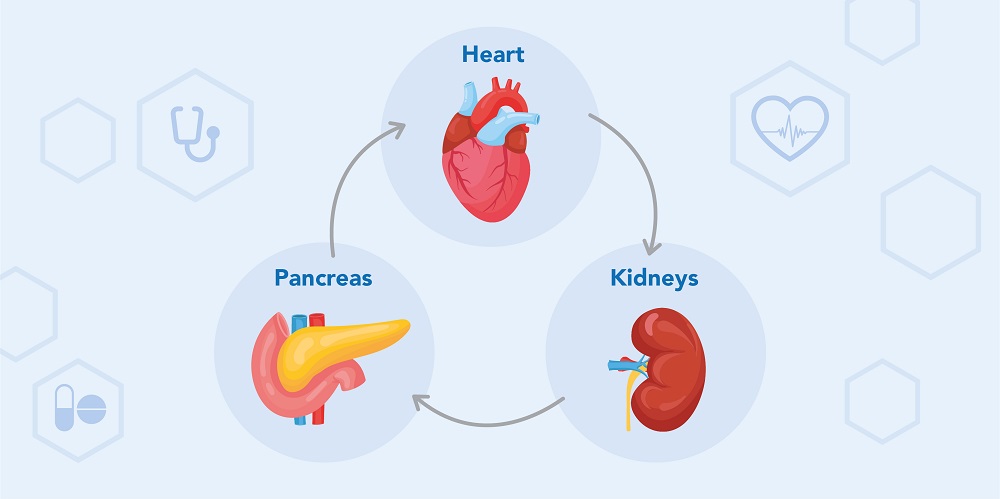
what-is-cvrm
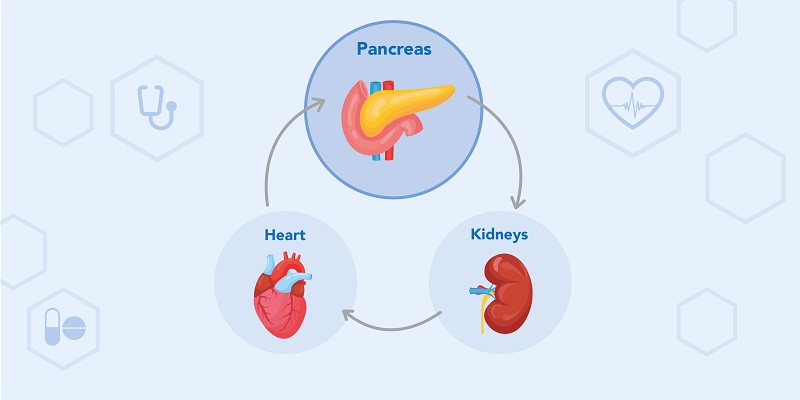
diabetes-type-2-and-cvrm
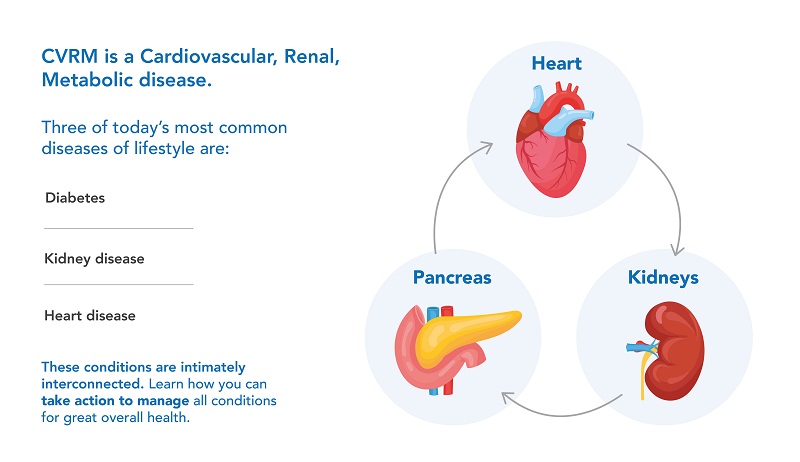
cardiovascular-disease-and-cvrm
